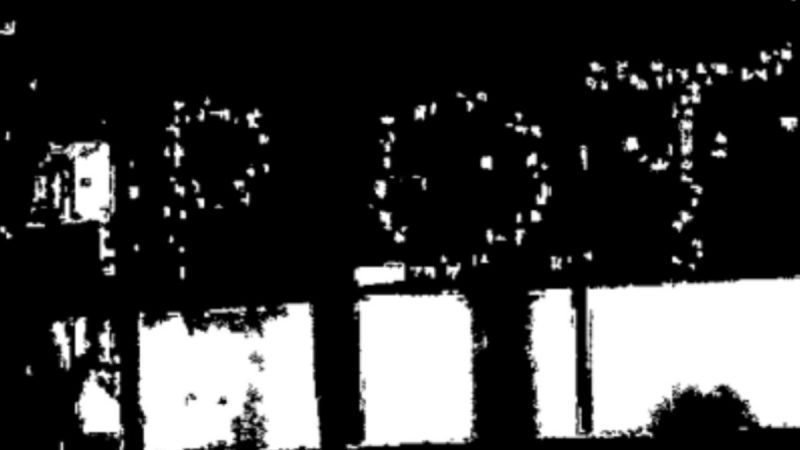A Christmas Miracle: Washington Court Overturns Marijuana Sign Rules That Banned String Lights Spelling 'Pot'
A judge concluded that the restrictions violate the state constitution's free speech guarantee.

The continued illegality of marijuana under the federal Controlled Substances Act complicates any attempt to claim that the First Amendment protects a state-licensed pot store's right to advertise its wares. But state constitutional protections for freedom of expression can still be used to overturn inadequately justified regulations of cannabis-related commercial speech, as demonstrated by a recent King County, Washington, ruling in favor of a marijuana shop that dared to hang Christmas lights spelling out the word POT in its window.
After Hashtag Cannabis in Redmond displayed that festive decoration during the 2017–18 holiday season, the Washington Liquor and Cannabis Board (LCB) cited the store for violating state restrictions on the size, number, and nature of retail signs. The regulations limit marijuana merchants to no more than two signs "identifying the retail outlet by the licensee's business name or trade name," each of which must be "affixed to a building or permanent structure" and no larger than 1,600 square inches. Hashtag already had two regular signs, pot was not part of its trade name, the string of lights was not "affixed," and it exceeded the allowed size by about 2,300 square inches.
Hashtag challenged the citation on free speech grounds. While the U.S. Supreme Court has upheld prohibitions of commercial speech "related to illegal activity," King County Superior Court Judge David Keenan noted in his ruling last month, state law allows cannabis sales to adults 21 or older by licensed retailers such as Hashtag. While conceding that "the issue is novel," Keenan concluded that the cannabis industry's legal status in Washington means state regulations of marijuana advertising must comply with Article I, Section 5 of Washington's constitution, which says "every person may freely speak, write and publish on all subjects, being responsible for the abuse of that right."
In applying that provision to restrictions on commercial speech, Washington courts use the test laid out in the 1980 Supreme Court case Central Hudson Gas & Electric v. Public Service Commission. To be constitutional under the Central Hudson test, a regulation of nonmisleading commercial speech must "directly and materially advance" a "substantial governmental interest," and it must be "narrowly drawn" to advance that interest.
The LCB defended its rules as a precaution against encouraging minors to consume cannabis. Keenan acknowledged that the state's asserted interest was "substantial," as Hashtag conceded. But he concluded that "the advertising restrictions do not directly and materially advance the State's substantial interest in preventing underage consumption" and "are not sufficiently tailored to advance the State's interest."
Keenan reached that conclusion based on seemingly inconsistent aspects of Washington's advertising rules. "Given other provisions in the advertising restrictions which continue to expose potential underage consumers to marijuana advertising," he said, "the restrictions are a poor fit with the State's substantial interest in preventing underage consumption."
Notwithstanding its picayune restrictions on store signs, Keenan noted, Washington's rules allow marijuana billboards that are much bigger. In fact, such billboards must be at least 55 square feet, or 7,920 square inches, five times the maximum size for store signs. A marijuana merchant might even rent a billboard right near his store, which would be a far more conspicuous advertisement than Hashtag's string of lights.
"Hashtag could have a sign using the word Pot if it just registers that business or trade name, and it could conceivably have an entire billboard next door to its store with the word Pot," Keenan observed. "If the State wishes to minimize the risk of capturing the attention of children, restricting retailers to two permanently affixed signs displaying the business or trade name of no more than 1,600 inches on premises, but allowing billboards off premises, and allowing businesses to register business or trade names such as Pot, does not directly advance that goal."
Keenan drew an analogy to the old federal rule prohibiting information about alcohol content on beer labels, which the Supreme Court overturned in the 1995 case Rubin v. Coors Brewing. "As the court put it in Rubin, where the government's asserted interest was to 'suppress strength wars,' it made 'no rational sense' to prohibit alcohol content advertising on labels, but allow it in advertising, where advertising 'would seem to constitute a more influential weapon in any strength war than labels,'" Keenan wrote. "As in Rubin, where the state's asserted interest is to prevent underage consumption of marijuana, it makes no rational sense to restrict advertising in marijuana retailers where underage consumers are not allowed to enter or make purchases, but not restrict billboards, where billboards would seem more effective at capturing the attention of potential underage consumers."
Although Keenan does not mention it, the Supreme Court overturned state restrictions on outdoor advertising of cigars and smokeless tobacco in the 2001 case Lorillard Tobacco v. Reilly, finding that the goal of preventing underage consumption did not justify rules that severely impeded communications between manufacturers and adult consumers. Hence it seems unlikely that a ban on marijuana billboards aimed at making Washington's rules more consistent would survive the Central Hudson test.
Hashtag co-owner Logan Bowers told The Stranger's Lester Black it cost $30,000 in legal fees to challenge the rules prohibiting his shop's string of lights. "I was just really pissed," he said. "We were frustrated with being dicked around. Sometimes doing the right thing costs a ton, and it's a little bit of a bummer. Even when you win, you still kind of lose, because you have to spend a lot of money, and it means if you don't have money, you don't get justice."


Show Comments (22)